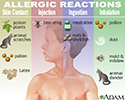MSG symptom complex
Hot dog headache; Glutamate-induced asthma; MSG (monosodium glutamate) syndrome; Chinese restaurant syndrome; Kwok's syndromeMSG symptom complex is a set of symptoms associated with eating food with the additive monosodium glutamate (MSG). MSG is the sodium salt of a common amino acid, glutamic acid. MSG is found naturally in our bodies and in many foods including cheese and tomatoes. MSG is added to many different types of foods as a flavor enhancer.
Causes
Reports of reactions to MSG originated in 1968 in a letter published in the New England Journal of Medicine. Since then, reports of reactions to MSG have come from people claiming to experience symptoms after consuming food containing MSG. However, studies on MSG in foods have failed to find a conclusive link between MSG and the symptoms some people describe.
The US Food and Drug Administration (FDA) did a study of the issue and found no evidence that MSG in food caused symptoms. The report did find minor reactions in people who consumed 3 or more grams of MSG alone without food. Most foods with MSG have less than 0.5 grams of the additive.
MSG is rated as "generally considered safe" by the FDA.
Symptoms
Symptoms, if they occur, are usually mild and go away in a short time:
- Flushing
Flushing
Skin blushing or flushing is a sudden reddening of the face, neck, or upper chest due to increased blood flow.
Read Article Now Book Mark Article - Headache
- Muscle aches
- Numbness or burning in or around the mouth
Numbness
Numbness and tingling are abnormal sensations that can occur anywhere in your body, but they are often felt in your fingers, hands, feet, arms, or le...
 ImageRead Article Now Book Mark Article
ImageRead Article Now Book Mark Article - Heart palpitations
- Tingling
- Drowsiness
Exams and Tests
There are no tests for MSG symptom complex.
Treatment
Most symptoms are mild, such as headache or flushing, and need no treatment.
Outlook (Prognosis)
Most people recover from perceived MSG symptom complex without treatment and have no lasting problems.
When to Contact a Medical Professional
Get emergency medical help right away if you have signs of a possible allergic reaction or another serious illness, including:
- Chest pain
- Heart palpitations
- Shortness of breath
- Swelling of the lips or throat
References
Aronson JK. Monosodium glutamate. In: Aronson JK, ed. Meyler's Side Effects of Drugs. 16th ed. Waltham, MA: Elsevier; 2016:1103-1104.
Bush RK, Baumert JL, Taylor SL. Reactions to food and drug additives. In: Burks AW, Holgate ST, O'Hehir RE, et al. eds. Middleton's Allergy: Principles and Practice. 9th ed. Philadelphia, PA: Elsevier; 2020:chap 80.
US Food and Drug Administration website. Questions and answers on monosodium glutamate. www.fda.gov/food/food-additives-petitions/questions-and-answers-monosodium-glutamate-msg. Updated April 4, 2018. Accessed July 30, 2024.
Allergic reactions - illustration
Allergic reaction can be provoked by skin contact with poison plants, chemicals and animal scratches, as well as by insect stings. Ingesting or inhaling substances like pollen, animal dander, molds and mildew, dust, nuts and shellfish, may also cause allergic reaction. Medications such as penicillin and other antibiotics are also to be taken with care, to assure an allergic reflex is not triggered.
Allergic reactions
illustration
Allergic reactions - illustration
Allergic reaction can be provoked by skin contact with poison plants, chemicals and animal scratches, as well as by insect stings. Ingesting or inhaling substances like pollen, animal dander, molds and mildew, dust, nuts and shellfish, may also cause allergic reaction. Medications such as penicillin and other antibiotics are also to be taken with care, to assure an allergic reflex is not triggered.
Allergic reactions
illustration
Review Date: 7/15/2024
Reviewed By: Frank D. Brodkey, MD, FCCM, Associate Professor, Section of Pulmonary and Critical Care Medicine, University of Wisconsin School of Medicine and Public Health, Madison, WI. Also reviewed by David C. Dugdale, MD, Medical Director, Brenda Conaway, Editorial Director, and the A.D.A.M. Editorial team.


